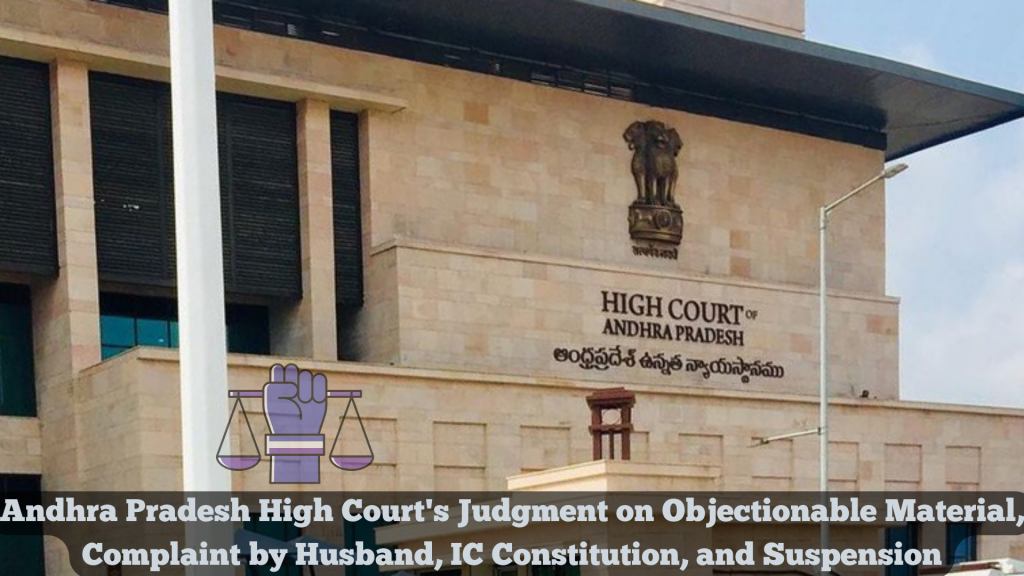
Andhra Pradesh High Court’s Judgment On Objectionable Material, Complaint By Husband, Ic Constitution, And Suspension
Judgement Given On : 23/03/2021
In the case of Nagaram Balakrishna vs. State of A.P. and Ors., the Andhra Pradesh High Court, on March 23, 2021, addressed various complex issues related to sexual harassment at the workplace. The court set aside the inquiry conducted by a Special Committee, citing that the husband of the aggrieved party lacked the legal standing to lodge such a complaint. This case raises important legal questions concerning the handling of objectionable material, the constitution of an Internal Committee (IC), and the suspension of the accused.
Nagaram Balakrishna, the petitioner, served as an Enforcement Superintendent in the Special Enforcement Bureau (SEB). During an investigation, the petitioner discovered a salesman involved in the illegal transportation of untaxed liquor. In the course of this investigation, he confiscated the salesman’s cell phone, which he then handed over to his colleague, a Sub-Inspector of Police (the “Aggrieved”), to extract evidence.
The husband of the Aggrieved filed a complaint of sexual harassment, alleging that the content on the confiscated cell phone was objectionable and constituted sexual harassment. As a result, the petitioner was relieved of his duties on the same day, and a three-member committee was constituted by the commissioner to conduct an inquiry. Subsequently, the petitioner was suspended from his position, prompting him to file a Writ Petition before the Andhra Pradesh High Court.
The petitioner challenged his suspension on various grounds, leading to a comprehensive examination by the court.
The primary legal issues addressed in this case were:
- The appropriateness of handing over a cell phone containing objectionable material to the Aggrieved as part of an investigation.
- The constitution of an IC and its seniority in relation to the petitioner’s position.
- The validity of a complaint filed by the husband of the Aggrieved.
- The suspension order and its compliance with the provisions of the Prevention of Sexual Harassment (POSH) Law.
The Andhra Pradesh High Court made significant findings and observations:
- Handling of Objectionable Material: The court ruled that the cell phone and its content were part of an official investigation carried out by the petitioner in his capacity as a police officer. In this context, requesting the Aggrieved to examine and copy the material did not constitute prima facie sexual harassment in the workplace. The court clarified that this decision was specific to the facts of this case and should not be treated as a precedent.
- Constitution of IC: The court noted that the Special Enforcement Bureau was a newly established department, and the IC was yet to be constituted. Therefore, a Preliminary Enquiry Team was formed to address the complaint on behalf of the Aggrieved. However, the court found that the formation of the Special Committee was contrary to the law, as the complaint should have been referred to a Local Committee. The court also emphasized that IC members should hold higher ranks than the accused, as required by the POSH Law.
- Complaint by Husband: The court held that the husband of the Aggrieved lacked the legal standing to file the complaint. According to Section 9 of the POSH Law, only the aggrieved party should file such a complaint. Allowing an incompetent person to lodge a complaint was deemed a serious illegality.
- Suspension Order: The court found that the suspension order did not comply with the provisions of the POSH Law. The petitioner’s suspension was based on a preliminary inquiry report, which the court considered contrary to the POSH Law’s procedures.
In light of the legal issues addressed, the Andhra Pradesh High Court issued several key directions:
- No Contact Conditions: Bail conditions should not permit contact between the accused and the victim to protect the complainant from further harassment.
- Immediate Notification: Complainants should be promptly informed of the accused’s bail, with a copy of the bail order provided within two days.
- Avoiding Stereotypes: Courts should refrain from using language or reasoning that diminishes the seriousness of the offense or trivializes the survivor’s trauma.
- No Compromises: Judges should not suggest or entertain notions of compromise, mediation, or marriage between the survivor and the accused.
- Sensitivity: Judges should display sensitivity throughout the proceedings to prevent the survivor from experiencing further trauma.
- Gender Sensitization: The National Judicial Academy was urged to include gender sensitization training as part of the education and training of judges to address stereotypes and biases in their decisions.
Conclusion
The Andhra Pradesh High Court’s judgment in the Nagaram Balakrishna case underscores the importance of upholding the principles of justice, gender sensitivity, and dignity in cases of sexual harassment at the workplace. It sets significant legal precedents regarding the handling of objectionable material, the constitution of ICs, the validity of complaints, and suspension orders in such cases. This judgment serves as a vital reminder of the judiciary’s role in ensuring fair and impartial proceedings while protecting the rights and dignity of survivors of sexual harassment.
